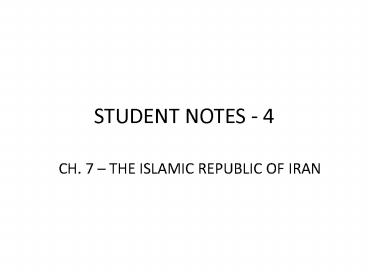STUDENT NOTES - 4 - PowerPoint PPT Presentation
1 / 15
Title:
STUDENT NOTES - 4
Description:
STUDENT NOTES - 4 CH. 7 THE ISLAMIC REPUBLIC OF IRAN How have Iranian leaders democratized the political process? Liberalization of the press and other media. – PowerPoint PPT presentation
Number of Views:107
Avg rating:3.0/5.0
Title: STUDENT NOTES - 4
1
STUDENT NOTES - 4
- CH. 7 THE ISLAMIC REPUBLIC OF IRAN
2
How have Iranian leaders democratized the
political process?
- Liberalization of the press and other media.
- Currently, the press is independent, but heavily
regulated by the government. - Satellite dishes are illegal, but many Iranians
have them anyway. - Elections (regular competitive)
- In 2003, however, the Council of Guardians chose
not to vet candidates. Even avowed secularists
were allowed to run. - In 2005, many secular Iranians boycotted the
elections as a form of protest to the
disqualification of candidates. - 2009 Green Movement
- Allowing more political parties/ allowing more
candidates to run. - Broadened participation of women. Islamic
feminism - Relaxation of the dress codes (examples of civil
liberties) - Veiling is now enforced less strictly and partial
covering of the head called mal-veiling has
spread. - Beginning in 1999, they have allowed for
local/city elections. - However, ultimate power rests with the unelected
bodies so voting is seen as a futile exercise
3
How have they resisted democratization of the
political process?
- Still, vetting of candidates.
- Shariah law governs election procedures
- The Basij morality police is a pro-regime
volunteer organization that monitors and contends
with the political activities of students and
faculties. They often mobilize political
activities of students for pro-regime activities
on the campuses. - Arresting professors/dissenter/demonstrations.
- Criticism of Supreme Leader forbidden.
- Guardian Council vetoes legislature. All are
directly or indirectly appointed by the Leader. - Blocking the Internet.
- Divorce laws are still degrading to women.
- According to Islamic law, marriage is a contract
whose clauses have to be agreed upon freely by
both husband and wife. A woman has the right to
ask her marriage contract include a clause giving
her the right to initiate divorce proceedings.
This clause, in the past, has had to be added to
the standard contract issued by the state, which
was rarely allowed (meaning women did not have
the right to ask for a divorce.)
4
- Media in Iran is both privately and publicly
owned. - Both are subject to censorship by the government.
- The government engages in censorship programs to
anything divergent from the countrys
regulations. - The majority of Iranians, around eighty-percent,
receive their news from government-owned media. - This helps reduce the assimilation of news into
the public sphere that the government does not
approve of. - Many Iranian citizens use VPN networks to surpass
the governments internet restrictions to use
social medias such as Twitter and Facebook.
5
- Around 963 pages in Iran are blocked from the
general public. - Half of these pages are about people.
- Of this half, around 108 citizens of Iran have
allegedly been killed and 161 have been detained. - Of the blocked pages
- - Civil and Political-------------- 42
- - Sex and Sexuality------------- 20
- - Religion---------------------------- 14
- - Human Rights------------------- 10
- - The Arts ---------------------------- 6
- - Media and Journalism----- 5
- -Academic Page-------------- 2
6
Current Policy Challenges
- Economic Policymaking most contentious topic
- 1980s liberal approach private sector, market
mechanisms - Mixed results, led to hardship, faced opposition
- Under Ahmadinejad
- Populist rhetoric of redistribution,
privatization - Uses government contracts to reward allies
- Spreading Progress and Prosperity
- State educational system good
- Birth control, health care
- Roads, basic services
7
POLITICAL ECONOMY AND DEVELOPMENT
8
REVIEW What is a rentier state?
- A state that is dependent on the export or sale
of one resource for the revenue it uses to
sustain the populations needs.
9
How is Iran a Rentier State?
- Irans main export is oil, and because taxes do
not guarantee much revenue, Iran is dependent on
its income from oil. As a result, Irans economy
will fluctuate due to the changes in the market. - Resource cursethe concept that revenue derived
from abundant natural resources, such as oil,
often bring unforeseen ailments to countries.
10
(No Transcript)
11
Current Policy Challenges
- First decade of Islamic Republic
- Some redistribution of wealth
- Leadership mostly from middle-class backgrounds
- Adopted populist policies, bettered poor
- Poverty, inequality, underemployment continue
- Constitution fiercely opposed to communism
- Job creation very inadequate
- Need to increase economic output population
grows 600,000 a year - Dissatisfaction with status quo among ethnic
minorities - Corruption
12
Current Policy Challenges
- Foreign Policy
- Under Shah - US an ally
- Now neither East nor West
- 1990s national interest rather than exporting
revolution dominated - Third World desire to escape hegemony of West
- Regional trade in goods, services with Middle
East - Main issue confronting Iranian diplomacy is
nuclear program - International Atomic Energy Agency monitoring
- Sanctions
13
(No Transcript)
14
(No Transcript)
15
(No Transcript)































